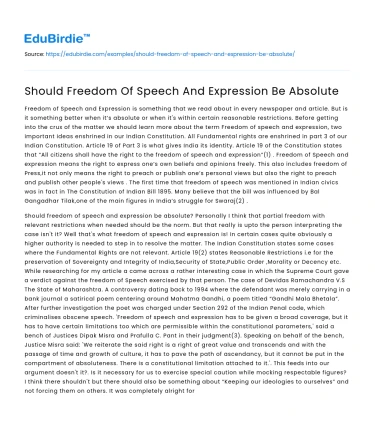Freedom of Speech and Expression is something that we read about in every newspaper and article. But is it something better when it’s absolute or when it's within certain reasonable restrictions. Before getting into the crux of the matter we should learn more about the term Freedom of speech and expression, two important ideas enshrined in our Indian Constitution. All Fundamental rights are enshrined in part 3 of our Indian Constitution. Article 19 of Part 3 is what gives India its identity. Article 19 of the Constitution states that “All citizens shall have the right to the freedom of speech and expression”(1) . Freedom of Speech and expression means the right to express one’s own beliefs and opinions freely. This also includes freedom of Press,it not only means the right to preach or publish one’s personal views but also the right to preach and publish other people's views . The first time that freedom of speech was mentioned in Indian civics was in fact in The Constitution of Indian Bill 1895. Many believe that the bill was influenced by Bal Gangadhar Tilak,one of the main figures in India’s struggle for Swaraj(2) .
Should freedom of speech and expression be absolute? Personally I think that partial freedom with relevant restrictions when needed should be the norm. But that really is upto the person interpreting the case isn't it? Well that's what freedom of speech and expression is! In certain cases quite obviously a higher authority is needed to step in to resolve the matter. The Indian Constitution states some cases where the Fundamental Rights are not relevant. Article 19(2) states Reasonable Restrictions i.e for the preservation of Sovereignty and Integrity of India,Security of State,Public Order ,Morality or Decency etc. While researching for my article a came across a rather interesting case in which the Supreme Court gave a verdict against the freedom of Speech exercised by that person. The case of Devidas Ramachandra V.S The State of Maharashtra. A controversy dating back to 1994 where the defendant was merely carrying in a bank journal a satirical poem centering around Mahatma Gandhi, a poem titled “Gandhi Mala Bhetala”. After further investigation the poet was charged under Section 292 of the Indian Penal code, which criminalises obscene speech. 'Freedom of speech and expression has to be given a broad coverage, but it has to have certain limitations too which are permissible within the constitutional parameters,' said a bench of Justices Dipak Misra and Prafulla C. Pant in their judgment(3). Speaking on behalf of the bench, Justice Misra said: 'We reiterate the said right is a right of great value and transcends and with the passage of time and growth of culture, it has to pave the path of ascendancy, but it cannot be put in the compartment of absoluteness. There is a constitutional limitation attached to it.'. This feeds into our argument doesn't it?. Is it necessary for us to exercise special caution while mocking respectable figures? I think there shouldn't but there should also be something about “Keeping our ideologies to ourselves” and not forcing them on others. It was completely alright for the poet to pen down his thoughts but was it right for him to publish it? That's where the real question lies.Animal Farm is a satirical book written by George Orwell . It was a book that was prescribed by my school. So Animal Farm is about the animals living on a farm and in reality it is a direct comparison to the Russian Revolution,as a direct result of Joseph Stalin’s Communism. So the debate here is that Joseph Stalin is a historical figure too so what about this type of satire? Like the Supreme Court verdict shouldn't this be termed as obscene or degrading a historical figure ? So doesn’t it become dependent on the whims and fancies of the person interpreting the case. Animal Farm as well as the poem both are satires but one was termed as ‘obscene’ and the other wasn't . I have no objection against the verdict but the matter really becomes one of partiality.
Save your time!
We can take care of your essay
- Proper editing and formatting
- Free revision, title page, and bibliography
- Flexible prices and money-back guarantee
I started this article with a clear idea and that was to make the readers connect with my writing. Should Freedom of Speech and Expression be absolute? Like i have reiterated throughout my article it should be under a few constraints and what constraints it should be under. But this is something that is different in all cases. So can someone argue that Freedom of Speech should be absolute? Like if someone spreads hatred about our country surely that's a constitutional limitation. Surely that doesn’t fall under Freedom. With the line ‘Freedom of Speech and Expression should be governed with important limitations’,I rest my case.
REFERENCES
- Constitution of India
- Constitutionofindia.net
- Businessstandard.com (May 14,2015).
Did you like this example?
Make sure you submit a unique essay
Our writers will provide you with an essay sample written from scratch: any topic, any deadline, any instructions.
Cite this paper
-
APA
-
MLA
-
Harvard
-
Vancouver
Should Freedom Of Speech And Expression Be Absolute.
(2021, September 29). Edubirdie. Retrieved February 15, 2025, from https://edubirdie.com/examples/should-freedom-of-speech-and-expression-be-absolute/
“Should Freedom Of Speech And Expression Be Absolute.” Edubirdie, 29 Sept. 2021, edubirdie.com/examples/should-freedom-of-speech-and-expression-be-absolute/
Should Freedom Of Speech And Expression Be Absolute. [online].
Available at: <https://edubirdie.com/examples/should-freedom-of-speech-and-expression-be-absolute/> [Accessed 15 Feb. 2025].
Should Freedom Of Speech And Expression Be Absolute [Internet]. Edubirdie.
2021 Sept 29 [cited 2025 Feb 15].
Available from: https://edubirdie.com/examples/should-freedom-of-speech-and-expression-be-absolute/
copy






 Stuck on your essay?
Stuck on your essay?

